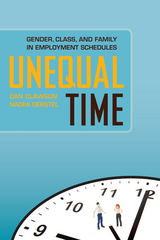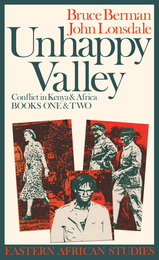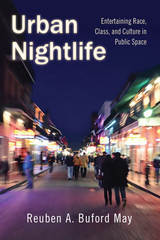152 books about Class and 3
start with U
152 books about Class and 3
152 books about Class
3 start with U start with U
3 start with U start with U

Unequal Time
Gender, Class, and Family in Employment Schedules
Dan Clawson is professor of sociology at the University of Massachusetts, Amherst. Naomi Gerstel is a distinguished university professor of sociology at the University of Massachusetts, Amherst.
Russell Sage Foundation, 2014
Life is unpredictable. Control over one’s time is a crucial resource for managing that unpredictability, keeping a job, and raising a family. But the ability to control one’s time, much like one’s income, is determined to a significant degree by both gender and class. In Unequal Time, sociologists Dan Clawson and Naomi Gerstel explore the ways in which social inequalities permeate the workplace, shaping employees’ capacities to determine both their work schedules and home lives, and exacerbating differences between men and women, and the economically privileged and disadvantaged. Unequal Time investigates the interconnected schedules of four occupations in the health sector—professional-class doctors and nurses, and working-class EMTs and nursing assistants. While doctors and EMTs are predominantly men, nurses and nursing assistants are overwhelmingly women. In all four occupations, workers routinely confront schedule uncertainty, or unexpected events that interrupt, reduce, or extend work hours. Yet, Clawson and Gerstel show that members of these four occupations experience the effects of schedule uncertainty in very distinct ways, depending on both gender and class. But doctors, who are professional-class and largely male, have significant control over their schedules and tend to work long hours because they earn respect from their peers for doing so. By contrast, nursing assistants, who are primarily female and working-class, work demanding hours because they are most likely to be penalized for taking time off, no matter how valid the reasons. Unequal Time also shows that the degree of control that workers hold over their schedules can either reinforce or challenge conventional gender roles. Male doctors frequently work overtime and rely heavily on their wives and domestic workers to care for their families. Female nurses are more likely to handle the bulk of their family responsibilities, and use the control they have over their work schedules in order to dedicate more time to home life. Surprisingly, Clawson and Gerstel find that in the working class occupations, workers frequently undermine traditional gender roles, with male EMTs taking significant time from work for child care and women nursing assistants working extra hours to financially support their children and other relatives. Employers often underscore these disparities by allowing their upper-tier workers (doctors and nurses) the flexibility that enables their gender roles at home, including, for example, reshaping their workplaces in order to accommodate female nurses’ family obligations. Low-wage workers, on the other hand, are pressured to put their jobs before the unpredictable events they might face outside of work. Though we tend to consider personal and work scheduling an individual affair, Clawson and Gerstel present a provocative new case that time in the workplace also collective. A valuable resource for workers’ advocates and policymakers alike, Unequal Time exposes how social inequalities reverberate through a web of interconnected professional relationships and schedules, significantly shaping the lives of workers and their families.
[more]

Unhappy Valley
Clan, Class & State In Colonial Kenya
Bruce Berman
Ohio University Press, 1991

Urban Nightlife
Entertaining Race, Class, and Culture in Public Space
May, Reuben A. Buford
Rutgers University Press, 2014
Sociologists have long been curious about the ways in which city dwellers negotiate urban public space. How do they manage myriad interactions in the shared spaces of the city? In Urban Nightlife, sociologist Reuben May undertakes a nuanced examination of urban nightlife, drawing on ethnographic data gathered in a Deep South college town to explore the question of how nighttime revelers negotiate urban public spaces as they go about meeting, socializing, and entertaining themselves.
May’s work reveals how diverse partiers define these spaces, in particular the ongoing social conflict on the streets, in bars and nightclubs, and in the various public spaces of downtown. To explore this conflict, May develops the concept of “integrated segregation”—the idea that diverse groups are physically close to one another yet rarely have meaningful interactions—rather, they are socially bound to those of similar race, class, and cultural backgrounds. May’s in-depth research leads him to conclude that social tension is stubbornly persistent in part because many participants fail to make the connection between contemporary relations among different groups and the historical and institutional forces that perpetuate those very tensions; structural racism remains obscured by a superficial appearance of racial harmony.
Through May’s observations, Urban Nightlife clarifies the complexities of race, class, and culture in contemporary America, illustrating the direct influence of local government and nightclub management decision-making on interpersonal interaction among groups.
Watch a video with Reuben A. Buford May:
Watch video now. (http://www.youtube.com/watch?v=VCs1xExStPw).
Watch video now. (http://www.youtube.com/watch?v=VCs1xExStPw).
[more]
READERS
Browse our collection.
PUBLISHERS
See BiblioVault's publisher services.
STUDENT SERVICES
Files for college accessibility offices.
UChicago Accessibility Resources
home | accessibility | search | about | contact us
BiblioVault ® 2001 - 2024
The University of Chicago Press









